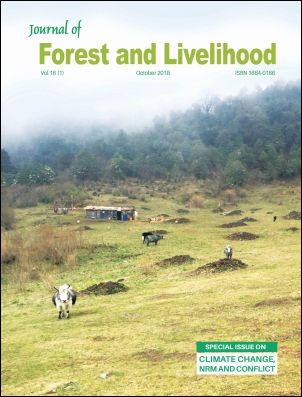REDD+ and Community Forestry in Nepal: Strengthening or Paralysing Decentralised Governance?
DOI:
https://doi.org/10.3126/jfl.v16i1.22881Keywords:
Access, community forestry, climate change, forest governance, NepalAbstract
At a time when community forestry has become a prominent mode of forest governance in many developing countries, REDD+ (Reducing Emissions from Deforestation and Forest degradation) has emerged as a new conservation policy to contribute to climate change mitigation by incentivising such countries to conserve forest. While the proponents of REDD+ claim that it can help to strengthen decentralised forest governance through an increased flow of resources of fund and knowledge, the critics evince that there are negative consequences of REDD+ implementation to the decentralisation process, local control, and access to forests. Drawing on the ongoing engagement of the authors in the national REDD+ policy process and an ethnographic study of the REDD+ initiatives in Nepal, this paper demonstrates that REDD+ might paralyze Nepal’s long-standing community forestry policy rather than strengthening it. Findings show the instrumental use of participation in REDD+ policy development and limited representation of local voices in the policy processes. The piloting project implemented on community forestry suggest that REDD+, if implemented at full scale, can put new demand(s) to the long-standing community forestry policy and practices resulting in threatening of local uses of forests by smallholders. The implementation of REDD+ is likely to reshape community forest management practices driven from the priority of generating revenue which in turn undermines the need to manage forests to meet diverse needs of the smallholders. This analysis indicates the need for paying greater attention to represent local voices in developing national policies and programs, and align REDD+ objectives to the core principles of community forest management, local access, and control of forests.
Downloads
Downloads
Published
How to Cite
Issue
Section
License
CC-BY-NC: This license allows reusers to distribute, remix, adapt, and build upon the material in any medium or format for noncommercial purposes only, and only so long as attribution is given to the creator.





